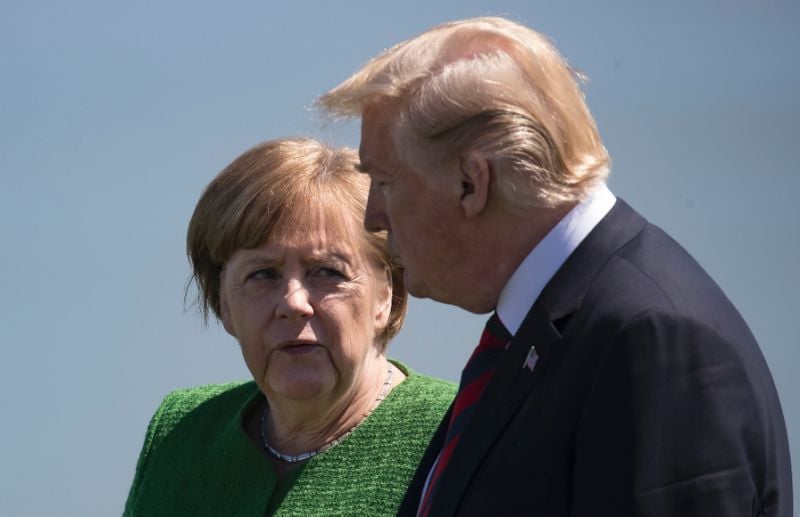
A defiant Interior Minister Horst Seehofer warned that he would give Merkel a fortnight to find a European deal to curb new arrivals by a June 28-29 EU summit, failing which he vowed to order border police to turn back migrants.
Merkel immediately rejected the threat, saying there would be "no automatism" if no European deal was found, and warned Seehofer and his Bavarian CSU party that she is ultimately in charge of government policy.
A top CSU official, Markus Soeder, insisted: "For us it is clear there will be automatism" and added that the results of the EU summit would be reviewed by Seehofer.
In Merkel migrant row, Germans back tough policies: poll
Wading into the crisis, Trump tweeted: "The people of Germany are turning against their leadership as migration is rocking the already tenuous Berlin coalition.
"We don't want what is happening with immigration in Europe to happen with us!"
The sharp escalation of tensions between Merkel and her long-time Bavarian allies came with EU nations once again at loggerheads over immigration, triggered by Italy's refusal this month to allow a rescue ship carrying 630 migrants to dock.
Arriving for talks with Merkel on Monday evening, Italian Prime Minister Giuseppe Conte stressed that his country cannot be left alone to deal with the influx.
"Italian borders are European borders. We must act together on several fronts rather than accept divisions in Europe on responsibility and solidarity," he warned.
Merkel therefore needs to balance Seehofer's demands to turn away migrants who have been registered in another EU country — often Italy or Greece as their first port of call — with the frontline nations' call for solidarity.
Popular misgivings over the migrant influx have given populist and anti-immigration forces a boost across several European nations, including Italy and Austria where far-right parties are now sharing power.
In Germany, voters in September's election handed veteran leader Merkel her worst score ever, giving seats for the first time to the far-right anti-Islam AfD.
Several high-profile crimes by migrants have also fuelled public anger. They include a deadly 2016 Christmas market attack by a failed Tunisian asylum seeker and the rape-murder in May of a teenage girl, allegedly by an Iraqi.
Seehofer has been one of the fiercest critics of Merkel's liberal stance under which over one million asylum seekers have been admitted into the country since 2015.
Stressing that Germany must change direction on immigration, Seehofer said: "I cannot say that we have a grip on the issue."
Seehofer, who took on the interior ministry portfolio less than 100 days ago, said he had only recently learnt that migrants who had already been denied asylum by Germany and been issued re-entry bans were still being allowed back in.
"In essence, that is a scandal," he said, promising to reverse the practice immediately.
With an eye on October's Bavaria state election, the CSU is anxious to assure voters that it has a roadmap to curb the migrant influx.
But Merkel says Seehofer's unilateral measure would leave countries at the EU's southern periphery alone to deal with the influx. Instead, she wants to find a common European solution at the EU summit in Brussels.
Merkel risks leading weak 'losers' coalition for Germany
"Turning away migrants at our borders at the heart of Europe will lead to negative domino effects that could hurt Germany, and put into question European unity," she warned.
Merkel now faces the challenge of persuading EU governments to sign up to a common plan on migrants.
Central and eastern EU nations such as Hungary and Poland have either refused outright or resisted taking in refugees under an EU quota system, and Austria has also taken an uncompromising stance.
Merkel will meet French President Emmanuel Macron in Germany on Tuesday.
Berlin is also reportedly preparing to call a meeting between Merkel and the leaders of several EU frontline nations in the migrant crisis ahead of the EU summit.
"It would be almost a miracle if she emerges a winner from the next EU summit," Welt daily said.
But the chancellor may have no choice, given Seehofer's vow to launch the nuclear option of shutting Germany's borders in defiance of her — an act of rebellion which would force his sacking.
That, an unnamed CDU source told Bild daily, "would be the end of the government and the alliance between CDU and CSU".

















COMMENTS
Comments are moderated and generally will be posted if they are on-topic and not abusive.
For more information, please see our Comments FAQ